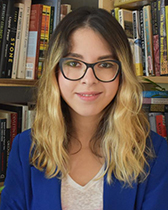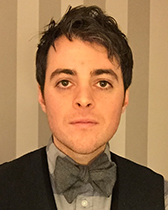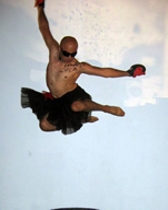Past Postdoctoral Fellows
In Residence 2022-2024
ACLS Emerging Voices Fellowship
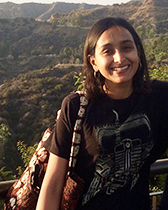 Postdoctoral Fellow of Environment, Race, & Ethnicity
Postdoctoral Fellow of Environment, Race, & Ethnicity
Chandana Anusha
Ph.D. in Sociocultural Anthropology, Yale University
Chandana Anusha is a scholar of social and environmental dynamics with a particular interest in coastal regions in India. Her first book project, The Living Coast: Port Development and Ecological Transformations in the Gulf of Kutch, Western India, focuses on how ecological and infrastructural processes intersect in an era of climate change and global trade. As a co-principal investigator of Mangroves and Tangled Futures, an SSRC-funded transregional collaboration on the Indian Ocean, she extends her attention to coastal development by tracing the connections between Gujarat and East Africa amid histories of trade and migration, expanding geopolitical agreements in agribusiness and energy extraction, and the rising influence of environmental change. She has taught courses on environmental justice, coastal built environments, and South Asia. From 2021-2022, she was a postdoctoral fellow with the Princeton Mellon Initiative of Architecture, Urbanism, and the Humanities at Princeton University. At Northwestern, Anusha will teach a course and assist in activities across the Council for Race and Ethnic Studies (CRES), the Environmental Humanities Research Workshop, and the Program in Environmental Policy and Culture.
- Office location: Kresge Hall 2350
- Email: chandana.anusha@northwestern.edu
Chandana Anusha's recent publications:
"Port Environments in South Asia." Comparative Studies of South Asia, Africa, and the Middle East 1 May 2024; 44 (1): 81–85. Co-written with Ayesha Omer and Devika Shankar
"What Makes a Natural Harbor: Naturalizing Port Development along the Gulf of Kutch, Western India." Comparative Studies of South Asia, Africa, and the Middle East 1 May 2024; 44 (1): 86–103
"Making Individual Claims under the Forest Rights Act (2006): Clarifying and Defining Adivasi Lands.” Contributions to Indian Sociology 2023; 57(3), 276-303
In residence 2021-2022
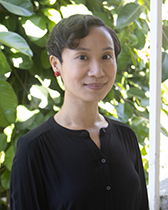 ACLS Emerging Voices Fellow
ACLS Emerging Voices Fellow
Tuyen Le
Ph.D. in Geography, UCLA
Tuyen Le is a geographer whose research focuses on conservation policy, political ecology, environmental justice, and affect. Her work examines how caring about the environment manifests into action, and how the environment’s value is socially and culturally articulated. Her first book manuscript, Scentscapes: Understandings of Nature, Consumption, and Commodification through Olfaction, centers on the cultivation, trade, regulation, and consumption of agarwood, a high-value non-timber forest product derived from a genus of endangered trees native to South and Southeast Asia. This work shows how variability in understandings of “nature” in daily practice, relationships between the environment and economies, and social-natural interactions shape resource use and conservation. Her current project, Tôi Chọn Cá: Environmental Policy and Politics in Contemporary Vietnam, focuses on a growing environmental justice movement in Vietnam. This research examines how novel visions of environmental justice emerge in a communist nation with a growing capitalistic economy.
In residence 2020-2022
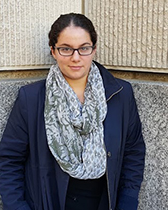 Postdoctoral Fellow
Postdoctoral Fellow
Negar Razavi
Ph.D. in Anthropology, University of Pennsylvania
Negar Razavi is a political anthropologist whose work focuses on national security, expertise, gender, race, humanitarianism, and U.S. foreign policy in the Middle East. Drawing on over two years of ethnographic research in DC, her research specifically examines the role of policy experts and think tanks in shaping U.S. security policies towards Iran and Egypt. Razavi has published her research in Critical Studies on Security and Signs: Journal of Women in Culture and Society, as well as more publicly-oriented media such as GenderAvenger, Jadaliyya, the Message, and the Middle East Report. Prior to joining the Kaplan Institute, Razavi was a Visiting Assistant Professor of Anthropology at William and Mary.
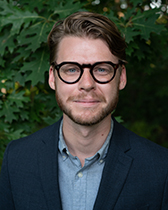 Postdoctoral Fellow in Digital Humanities
Postdoctoral Fellow in Digital Humanities
Joseph Whitson
Ph.D. in American Studies, University of Minnesota
Joseph Whitson is a Postdoctoral Fellow with a joint appointment in the Department of History and the Kaplan Humanities Institute. Whitson works at the intersection of environmental humanities, Indigenous studies, and new media, interrogating the role of settler-colonialism in the digital world. His current project, Marketing the Wilderness: The Digital Battle over Public Land in the United States, is a digitally integrated book manuscript that unpacks the colonial foundations of the outdoor industry and the ways in which Indigenous activists are using social media to challenge them. As a public historian, Joseph runs Indigenous Geotags, a social media-based organization that tells the Indigenous history of American national parks and public lands. He has previously worked on publicly engaged projects with organizations like the Humanities Action Lab, the National Park Service, and the Minnesota Historical Society. His teaching interests include environmental history, digital humanities, American culture and society, and settler-colonial studies.
In residence 2019-2021
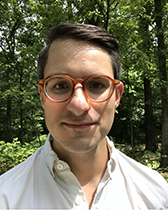 Postdoctoral Fellow in Digital Humanities
Postdoctoral Fellow in Digital Humanities
John R. Ladd
Ph.D. in English Literature, Washington University in St. Louis
John Ladd is a postdoctoral fellow at the Kaplan Institute for the Humanities, where he uses archival research and digital methods to investigate the ways early modern material practices and social networks shape literary forms. His current project, Network Poetics: Studies in Early Modern Literary Collaboration, reflects these interests by arguing that despite the rise of authorial individuation throughout the early modern period, collaborative, networked forms of writing persist and continue to take new shapes even after the Restoration. As part of his fellowship at Northwestern, he's helping to improve and analyze digital transcriptions of early printed books as a member of the EarlyPrint project. John's writing has appeared in Milton Studies, The Shakespeare Newsletter, and The Programming Historian, and he previously worked as research fellow for the Six Degrees of Francis Bacon digital project. His teaching interests include early modern literature and culture, digital humanities, Shakespeare and Renaissance drama, Milton and Restoration literature, and the history of the book. His website is here.
Postdoctoral Fellow in Environmental Humanities
Zeynep Oguz
Ph.D. in Cultural Anthropology, The City University of New York
Zeynep Oguz is a Postdoctoral Fellow with a joint appointment in the Department of Anthropology and the Kaplan Humanities Institute. Located at the intersection of environmental anthropology, political geography, and Science and Technology Studies (STS), her work examines the ways in which politics and earth intersect. Her current project, Sedimenting Territory: Political Geologies of Oil, Resource Nationalism, and Colonial Violence in Turkey, examines how oil, petroleum geology, and energy infrastructures have played a role in the making and unmaking of territorial formations in Turkey, especially in relation to the Kurdish and Cyprus issues. Zeynep’s articles are forthcoming in Political Geography and several edited collections. Her teaching interests include postcolonial science and technology studies; multispecies anthropology; time and temporality; space and power; and energy humanities.
In residence 2018-2019
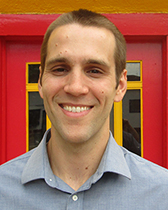 Postdoctoral Fellow in Digital Humanities
Postdoctoral Fellow in Digital Humanities
Andrew G. Britt
Ph.D. in Latin American History, Emory University
Andrew Britt is a historian of modern Latin America and a digital scholarship developer. His research and teaching center on geography, ethnoracial identity, and racialized inequalities, especially in postemancipation Brazil. His book manuscript, “I’ll Samba Someplace Else": Planning Dislocations in Ethnoracial São Paulo, 1930s-1980s, charts the compelling interwoven histories of three of the city of São Paulo’s most prominent racialized/ethnicized neighborhoods: “Japanese” Liberdade, “Italian” Bela Vista, and “Afro” Brasilândia. The project combines archival research and oral histories with less conventional methods, especially historical mapping, to show that the construction of São Paulo’s most iconic immigrant neighborhoods hinged on the dislocation of Afro-descendants and places they considered sacred. In parallel to his work on modern Brazil, Britt is active in the development of custom digital research methods, especially mapping platforms that engage marginalized populations in reconstructing hallowed histories. He worked on user experience and Portuguese translation for Voyages: The Transatlantic Slave Trade Database. He is currently a member of a digital atlas project titled Paulicéia 2.0 and based at the Federal University of São Paulo (UNIFESP), Emory University, and the Brazilian National Institute for Space Research (INPE). He co-led a community history project about Atlanta’s English Avenue and Vine City neighborhoods and is developing a web-based exhibit about São Paulo’s Brasilândia district (in production). At Northwestern in 2018-2019, Britt taught “Hitchhiking the Atlantic” and “Bulldozed: Chicago and São Paulo.”
In residence 2017-2019
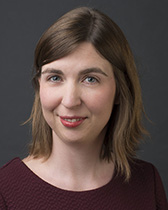 Postdoctoral Fellow in Environmental Humanities
Postdoctoral Fellow in Environmental Humanities
Sarah Dimick
Ph.D. in English Literature, University of Wisconsin-Madison
Sarah Dimick is a Postdoctoral Fellow with a joint appointment in the Department of English and the Kaplan Institute for the Humanities. Her work is located at the intersection of climate science and global Anglophone literatures of the 20th and 21st centuries. Her current project, Climatic Arrhythmias: Global Warming, Literary Form, and Environmental Time, examines how literature both documents and responds to the disrupted temporal ecologies of the Anthropocene. Sarah’s articles are forthcoming in Mosaic and ISLE: Interdisciplinary Studies in Literature and the Environment, and her discussion of the challenges of animating climatic research for a public audience can be found in the environmental humanities journal Edge Effects. In her broader research and teaching, she engages a variety of ecocritical approaches, including environmental justice, postcolonial and feminist environmentalisms, animal studies, petroaesthetics, and theories of the environmental future.
In residence 2017-2018
Postdoctoral Fellow in Critical Race Studies
Kaneesha Cherelle Parsard
Ph.D. in American Studies and African American Studies, and the Certificate in Women's, Gender, and Sexuality Studies, Yale University
Kaneesha Cherelle Parsard is the Postdoctoral Fellow in Critical Race Studies, and holds affiliations with the Kaplan Institute, the Department of African American Studies, and the Latin American and Caribbean Studies Program. Her expertise lies in examining Caribbean literary and visual cultures through feminist approaches to the legacies of African slavery and Indian indentureship. Her first book project, Improper Dwelling, uses analysis of British West Indian literary and visual cultures as well as archival materials to examine how British colonial housing and planning sought to manage and separate African and Indian labor populations in the period between emancipation and independence. Kaneesha's research has been supported by the Mellon Mays Undergraduate Fellowship, the Social Science Research Council, and the American Council of Learned Societies and her writing is published in American Quarterly and the volume Indo-Caribbean Feminist Thought.
In residence 2016-2018
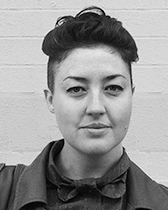 Postdoctoral Fellow in Native American and Indigenous Studies
Postdoctoral Fellow in Native American and Indigenous Studies
Hi‘ilei Julia Kawehipuaakahaopulani Hobart
Ph.D. in Food Studies, New York University
Hiʻilei Julia Kawehipuaakahaopulani Hobart is a Postdoctoral Fellow in Native American and Indigenous Studies, with a joint appointment in the Kaplan Institute, Program in Science in Human Culture, and Asian American Studies. Her work looks at the points of intersection between foodscapes and indigeneity. Hiʻilei’s doctoral dissertation applies the framework of Settler Colonialism to food culture, and shows how taste qualities and food temperature index territorial power in Hawaiʻi. She is especially interested in the history of commodity ice and refrigeration in the Pacific, the development of new technology in the nineteenth century, the affective registers of comfort and home-making, and indigenous embodiment and environmental knowledge. Before joining Northwestern, Hiʻilei taught a number of undergraduate classes at NYU where she developed syllabi on topics including critical food studies, material culture, and cuisine. She has recently published on frozen meat, localism and ‘Local’ food in Hawai‘i, and guest edited for the journal Food, Culture, and Society.
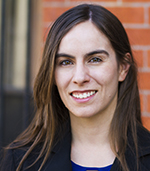 Andrew Mellon Postdoctoral Fellow in Dance Studies
Andrew Mellon Postdoctoral Fellow in Dance Studies
Elizabeth Schwall
Ph.D. in History, Columbia University
Elizabeth Schwall received her Ph.D. in Latin American and Caribbean History from Columbia University in 2016. Her interdisciplinary research and teaching combines History and Dance Studies to shed new light on the physical movements that animated daily life, politics, and intellectual inquiry in the region. Her book manuscript, Political Moves: Dance and Power in Revolutionary Cuba, examines dance as revolutionary politics, labor, and leisure in Cuba from 1930 to 1990. Her broader research interests include Brazilian history, Latin American performance, Cold War cultural diplomacy, and the histories of migration and community building through art. Essays accepted for publication will appear in the Hispanic American Historical Review and two edited volumes. Her book reviews and encyclopedic entries have appeared in Dance Research Journal, Cuban Studies, New West Indian Guide/Nieuwe West-Indische Gids, Routledge Encyclopedia of Modernism, and the Dictionary of Caribbean and Afro-Latin American Biography. She has taken many dance classes over her years of travel and research. She encourages students studying abroad to contact her for tips on dance classes in Havana, Santiago de Cuba, Rio de Janeiro, Mexico City, or Santiago, Chile.
In residence 2015-2017
Andrew W. Mellon Postdoctoral Fellow in Digital Humanities
Daniel Snelson
Ph.D. in English, University of Pennsylvania
Danny Snelson began a two-year residency in fall 2015 as our first Mellon Postdoctoral Fellow in the Digital Humanities, with a joint appointment in the Kaplan Institute and the English Department. His research and teaching blend a study of poetry and poetics with work on digital and network cultures, material text studies, and media theory. His dissertation, “Variable Format: Media Poetics and the Little Database” moves away from “big data” analysis to consider relatively small online collections of digital objects, particularly noting ways that print, sound, and cinema work within the new media context of twentieth-century art and literature. Danny teaches courses that engage in digital cultures from a humanities perspective and contribute scholarly expertise to general digital humanities initiatives. His course, "Print-on-Demand Poetry: Making Books After the Internet," examines the emergence of innovative forms of writing under the influence of digital networks, inviting students to experiment with Print-on-Demand in a series of collaborative and independent scholarly projects. Visit Danny's website here.
In residence 2014-2016
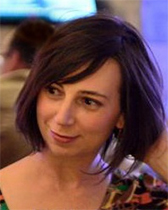 Andrew W. Mellon Postdoctoral Fellow in Dance Studies
Andrew W. Mellon Postdoctoral Fellow in Dance Studies
Amanda Jane Graham
Ph.D. in Visual and Cultural Studies, University of Rochester
Amanda Jane Graham’s interests include spatial theory, social activism, museum studies, and curatorial practice. Her teaching and research on post 1960 American dance, art, architecture, and urban development draw on these topics. In her dissertation, Amanda examines how New York City experimental dance by Trisha Brown and Lucinda Childs moved from informal, often outdoor, performance spaces to the formal proscenium stage. Amanda has published articles on dance, visual art, and culture and media in academic journals including Dance Chronicle, Latin American Perspectives, and InVisible Culture. Additionally, she has contributed several essays on the political stakes of art making and pedagogy to curatorial catalogues, artist books, and edited collections including Nadia Myre: En[counter]s and Collaborative Futures: Critical Reflections on Publicly Active Graduate Education. Amanda has presented at many conferences including the Society of Dance History Scholars, the Society for Cinema and Media Scholars, the College Art Association, and the Frick Symposium. As a gallery director, Amanda organized exhibitions for up-and-coming and established artists, including South African artist William Kentridge. She taught courses on Avant-Garde scores, dance, and visual art collaborations.
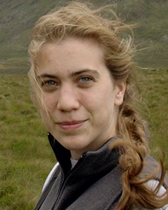 Andrew W. Mellon Postdoctoral Fellow in Environmental Humanities
Andrew W. Mellon Postdoctoral Fellow in Environmental Humanities
Sheila Wille
Ph.D. in History, University of Chicago
M.A. in Historical Archaeology, Illinois State University
Sheila Wille is an environmental historian of eighteenth- and early nineteenth-century Britain and the empire, with a special interest in the history of entomology. Her current project links political, environmental, intellectual, and religious history to explore the history of eighteenth-century entomology and the increasing visibility of insects in that period. Insects combined with other newly unmanageable sectors of the natural world to threaten, and subsequently strengthen, foundational and politically influential enlightenment claims that nature was stable, fruitful, and self-equilibrating. In addition to her training in history, Dr. Wille maintains an interdisciplinary interest in archaeology, material culture studies, environmental studies, and all things entomological, and encourages students to contact her about their research interests in any of these fields. Sheila taught courses on the history of botany and entomology in the British Empire, as well as on apocalypse narratives in the West.
In Residence 2012-2014
Andrew W. Mellon Postdoctoral Fellow in Dance Studies
Jose Luis Reynoso
Ph.D. in Culture and Performance, UCLA
Jose Luis Reynoso's interests include critical theory and pedagogy, the explicit and implicit politics of choreography, ideologies of artistic identity, and the role of corporeality in knowledge production. Applying these perspectives, Jose writes and teaches about various aspects of modern/contemporary dance in Mexico and the U.S. with an emphasis on the intersection of race, gender, class and sexuality. In his dissertation, Jose examines the role that ballet and modern dance played in the construction of post-revolutionary, modern Mexico from 1919 to 1940. Reynoso has presented at several conferences, including Dance Under Construction, Danza Teorica, Congress on Research in Dance, and the Society of Dance History Scholars. As a performer and choreographer, he has collaborated with multiple choreographers and performance artists including Hae Kyung Lee, David Roussève, Guillermo Gomez-Peña, and Roberto Sifuentes. He has also presented his own choreographic work nationally and internationally.
In Residence 2010-2013
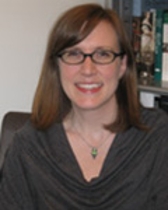 Terra Foundation Postdoctoral Fellow in Art History
Terra Foundation Postdoctoral Fellow in Art History
Melody Deusner
Ph.D. in Art History, University of Delaware
Melody Deusner specialized in late nineteenth- and early twentieth-century art, with particular emphasis on the study of American painting and mass culture in an international context. Her doctoral dissertation, “A Network of Associations: Aesthetic Painting and its Patrons, 1870–1914,” probed the startling convergence between the pursuit of an art for art’s sake—which promotes the activity of selection, arrangement, and the orchestration of harmonious visual effects as the true substance of picture-making—and the organizational imperatives of systems management and network building in the political and corporate spheres in turn-of-the-century Britain and America. Her research has been sponsored by the Smithsonian American Art Museum, the Luce Foundation/ACLS, the Kress Foundation, and the Metropolitan Museum of Art, with ongoing support provided by the Terra Foundation for American Art. She taught graduate and undergraduate courses in Art History.
In Residence 2010-2012
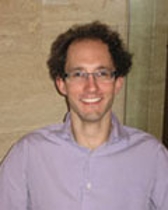 Andrew W. Mellon Postdoctoral Fellow in Medieval Studies
Andrew W. Mellon Postdoctoral Fellow in Medieval Studies
Mark Kauntze
Ph.D., Yale University
Mark Kauntze’s research focused on the Latin literature and philosophy of the High Middle Ages. He was particularly interested in the transmission of ancient thought, the theory and practice of rhetoric, and medieval accounts of the history of philosophy. During his fellowships, Mark was completing a monograph on the twelfth-century poet Bernardus Silvestris, and working on a critical edition of the second part of Roger Bacon’s Opus maius. He taught Medieval Latin in the Graduate Classics Cluster.
In Residence 2010-2011
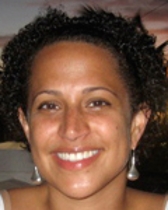 Andrew W. Mellon/ACLS Postdoctoral Fellow
Andrew W. Mellon/ACLS Postdoctoral Fellow
Elizabeth Todd-Breland
Ph.D. in History, University of Chicago
Elizabeth's research project, "A Political Education: Race, Politics, and Education in Post-Civil Rights Chicago," investigated Black political organizing in Chicago around inequities in public education. Between the late 1960s and the 2000s Black Chicagoans organized within and outside of the public school system around integration, Black educational institution building, and community control. These diverse ideological and programmatic approaches eventually coalesced into unlikely alliances to navigate an increasingly privatized public education system. This project forces a reconsideration of the complexity of Black civic life and political possibilities in urban America in the Post-Civil Rights era. Investigating political organizing within, and beyond, the institutional setting of public schools furthers understandings of the dynamic relationship between schools and communities.

